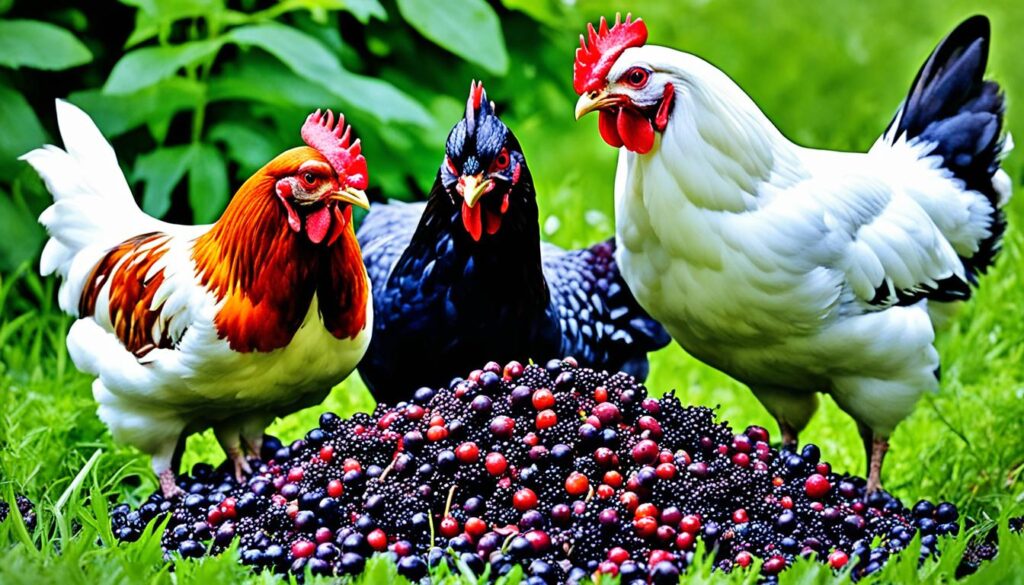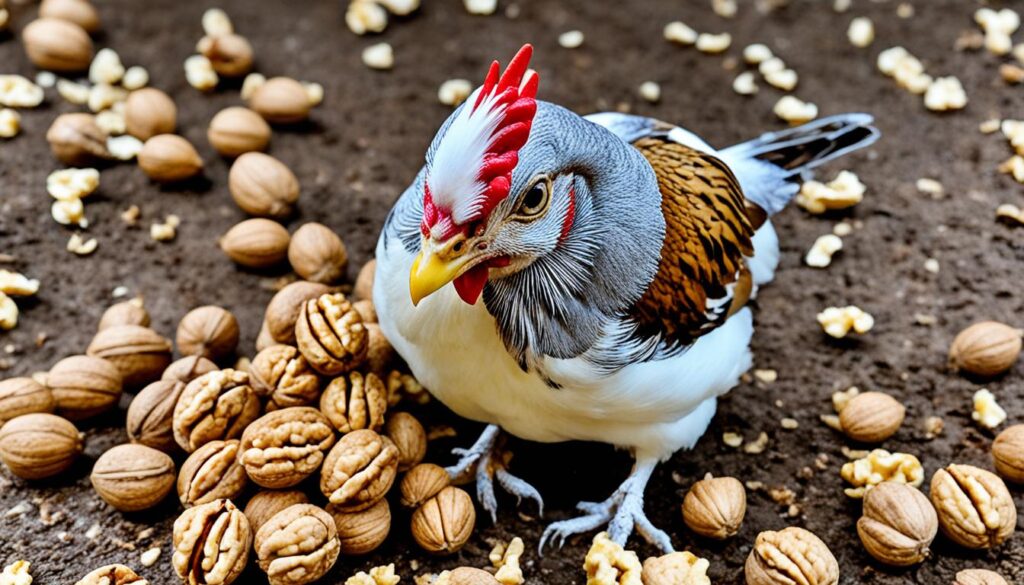Did you know a single elderberry bush can give up to 12 pounds of berries every year? If you have backyard chickens, you might wonder if these berries are good for them. The answer is yes and no – elderberries are great for chickens’ health but some parts are toxic.
In this guide, we’ll look at how to safely feed elderberries to your backyard flock. We’ll make sure they stay safe and healthy.
Key Takeaways
- Elderberries are a superfood that can benefit backyard chickens a lot.
- But, the leaves, stems, and unripe berries can be toxic to chickens.
- It’s important to know which elderberry types and how to prepare them safely for your chickens.
- Elderberry syrup, made with organic berries, honey, and spices, is a great treat for chickens.
- Remember, elderberries should be given as an occasional treat, not every day.
Introducing Elderberries: A Superfood for Chickens
Elderberries have been a natural remedy for health issues for centuries. These berries are great for humans and can help your backyard chickens too. They are full of vitamins, minerals, and antioxidants that can make your flock healthier.
What are Elderberries?
Elderberries are small, dark fruits from the elder tree. This tree is found in many places around the world. People have always valued these berries for their nutrition and health benefits. They are a superfood for chickens.
Nutritional Profile and Benefits of Elderberries for Chickens
Elderberries are packed with essential vitamins, minerals, and antioxidants. They have a lot of:
- Vitamin C, which boosts the immune system
- Vitamin A, crucial for eye health and feather development
- Calcium and phosphorus, supporting strong bones and eggshells
- Potassium, aiding muscle function and heart health
Elderberries also have antiviral, antibacterial, and anti-inflammatory properties. These can help protect your chickens from health problems. Adding elderberries to their diet can make them healthier, happier, and less likely to get sick.
“Elderberries can boost a flock’s immune system, keeping them healthy and productive.”
You can feed your chickens fresh, cooked, or elderberry syrup. These berries are a great way to give them a superfood boost. They support their health and happiness.
Elderberry Safety Precautions for Chickens
Elderberries can be a great food for your chickens, but you need to know the risks. The stems, leaves, roots, and unripe berries have cyanide-inducing glycosides. These can be harmful to your chickens.
Toxic Parts of the Elderberry Plant
To keep your chickens safe, don’t give them these elderberry parts:
- Stems
- Leaves
- Roots
- Unripe berries
Identifying Safe and Unsafe Elderberry Varieties
Not all elderberries are safe for chickens. Some, like the American black elderberry (Sambucus canadensis), are safer. But others might have more toxins. Make sure to check which elderberries are safe in your area before feeding them to your flock.
| Elderberry Variety | Toxicity Level |
|---|---|
| American Black Elderberry (Sambucus canadensis) | Relatively low toxicity when ripe |
| European Elder (Sambucus nigra) | Higher toxicity levels |
| Dwarf Elderberry (Sambucus ebulus) | Highly toxic |
By knowing the risks and being careful, you can give your chickens elderberries safely. This way, they get a tasty and healthy treat.
can chickens eat elderberries?
Chickens can eat elderberries, but with some rules. Only give them ripe berries and not the stems, leaves, roots, or unripe berries. These can be harmful.
Elderberry leaves, stems, roots, and unripe fruit have a lot of cyanide. This can be toxic to chickens. The European Elder and American Elder are the same type, but the American Black Elder has more health benefits. But, the seeds, stems, leaves, and roots are still poisonous to birds.
Eating too much of these can cause nausea, vomiting, diarrhea, and even coma. But, cooking elderberries makes them safe for chickens. Heat also makes the berries better for them.
Chickens like elderberry fruits more than the plant parts. Putting chicken wire around the plant before the fruit ripens is a good idea. Even though chickens might avoid some toxic plants, it’s safer to keep them away from them.
| Toxic Plant Part | Effect on Chickens |
|---|---|
| Leaves, stems, roots, unripe berries | Contain cyanide-inducing glycosides that can lead to nausea, vomiting, diarrhea, and even coma |
| Ripe, mature berries | Generally safe for chickens to consume, as the toxic compounds are primarily found in other parts of the plant |
With the right safety steps, you can give elderberries to your backyard flock. They’ll get a tasty and healthy treat.
Feeding Methods: Raw, Cooked, and Elderberry Syrup
Feeding elderberries to your backyard chickens offers several options. You can give them raw, ripe elderberries directly. This way, your chickens get to enjoy the berries in their natural state and get all the nutrients they offer.
Another safe option is to cook the elderberries first. This step removes any harmful compounds. Cooked berries can be a tasty and healthy part of your chickens’ meals.
Elderberry Syrup: A Holistic Treat for Your Flock
Elderberry syrup is another great way to feed your chickens. It’s made by simmering dried elderberries with water and mixing in raw honey. This syrup is a tasty and wholesome treat for your chickens.
| Elderberry Syrup Recipe | Dosage and Storage |
|---|---|
|
|
Elderberries are packed with nutrients and can be a great addition to your chickens’ diet. You can feed them raw, cooked, or as elderberry syrup. Any way you choose, your chickens will love this superfood.

Incorporating Elderberries into Your Flock’s Diet
Elderberries can be a great addition to your chicken’s diet, but only as an occasional treat. Chickens naturally avoid toxic plants. They prefer healthier food sources if they can find them.
When adding elderberries to your chickens’ diet, make sure they get a balanced diet from their regular food. Elderberries should be just a little extra. This keeps their natural foraging habits and gives them extra health benefits.
Elderberries as an Occasional Treat
Elderberries are full of antioxidants, vitamins, and minerals that are good for chickens. But, don’t give them too much to avoid digestive problems. Offer elderberries as a special treat a few times a week.
- Watch how your chickens react to elderberries and keep an eye on how much they eat.
- Give your chickens a mix of fresh foods like leafy greens, veggies, and insects for a balanced diet.
- Let your chickens forage in your backyard or special areas to find more natural food.
Adding elderberries as an occasional treat gives your flock extra nutrients. It keeps their diet healthy and balanced.

Benefits of Feeding Elderberries to Chickens
Adding elderberries to your backyard chickens’ diet is great for their health. These berries are packed with vitamins, minerals, and antioxidants. They help strengthen the immune system and support breathing.
Elderberries are full of vitamin C, with 36mg per 100g. They also have vitamins A, B1, B2, B3, B5, B6, and folate. Plus, they have calcium, iron, and potassium. These nutrients boost a chicken’s immunity, helping them fight off illnesses.
Elderberries also have anti-viral and anti-inflammatory properties. These can help chickens with breathing problems. Feeding your flock these chicken treats supports their respiratory health.
| Nutrient | Amount per 100g |
|---|---|
| Carbohydrates | 18.4g |
| Fiber | 7g |
| Vitamin C | 36mg |
| Calcium | 38mg |
| Iron | 1.6mg |
| Potassium | 280mg |
Make sure to only give your chickens ripe, cooked elderberries. This avoids any toxicity issues. Following these steps, you can give your flock a tasty, nutritious treat. It will support their health and happiness.
“Elderberries are a true superfood for chickens, offering an abundance of vital nutrients and health-boosting properties that can greatly benefit their overall well-being.”
Conclusion
Backyard chickens can eat ripe, mature elderberries as a healthy addition to their diet. The other parts of the elderberry plant are toxic, but the berries are full of nutrients. These berries can help keep backyard chickens healthy and happy.
Feeding your chickens elderberries safely is easy with the right methods and precautions. You can feed them raw, cooked, or as elderberry syrup. This guide has given you the info to safely add elderberries to your chickens’ diet.
Elderberries have stayed the same since the Stone Age, unlike many other foods. The unripe fruit can be poisonous, but ripe berries are good for health. Some people even eat fried elderberry flowers, showing how versatile this plant is in cooking.
Elderberry plants can live up to 100 years, making them long-lasting. There are many types of elderberries, each with its own look and size. While some elderberries don’t live as long as wild ones, they still look beautiful in gardens. They also attract birds that love the fruit.
FAQ
What are elderberries and are they safe for chickens to eat?
Elderberries are an ancient remedy that can help chickens too. The ripe berries are safe for them. But, avoid giving them stems, leaves, roots, or unripe berries as they are toxic.
What are the nutritional benefits of elderberries for chickens?
Elderberries are packed with vitamins, minerals, and antioxidants. These nutrients support the health of backyard chickens. They offer a lot of vitamin C, vitamin A, calcium, phosphorus, and potassium.
How can I safely feed elderberries to my chickens?
You can give elderberries to your chickens raw, cooked, or as syrup. Make sure they only get the ripe berries. Avoid giving them stems, leaves, roots, or unripe berries as they are harmful.
Can I incorporate elderberries into my chickens’ regular diet?
Elderberries can be a good treat for chickens but should not be a main part of their diet. They should eat a balanced diet from their regular feed. Elderberries can be given as a special treat.
What are the overall benefits of feeding elderberries to backyard chickens?
Giving elderberries to backyard chickens has many benefits. It helps boost their immune system, supports their respiratory health, and keeps them healthy overall. This is due to the berries’ high levels of antioxidants, vitamins, and minerals.



